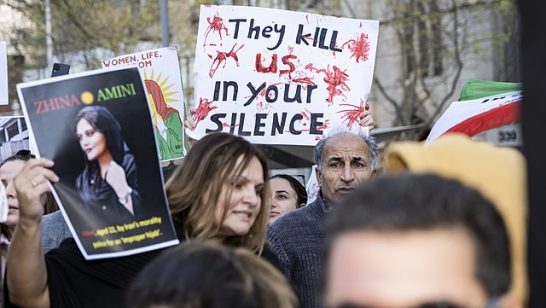
The deal to prevent Iran from acquiring a nuclear bomb, the Joint Comprehensive Plan of Action (JCPOA), is being implemented. Iranian centrifuges have been dismantled; enriched uranium has been shipped to Russia; the Chinese are rebuilding the heavy water reactor; and the UN and EU sanctions have been lifted. Billions of Iran´s frozen assets are being released. The deal is so far going according to plan. The EU can be proud of its initiative to start negotiations with Iran in 2003. These efforts have effectively prevented a military strike on Iran´s nuclear facilities with potential catastrophic consequences for a region already in turmoil.
The EU has demonstrated its important role as a global actor in non-proliferation. Now it can reap the benefits. European trade delegations, along with those from Russia and China, fill Tehran’s hotels. A market of 80 million people is ready to be accessed. Government officials and business managers are waiting for the US Treasury´s instructions on the lifting of US sanctions to know when and on what conditions it is safe to invest in Iran.
At the same time, as observed in the context of Iran’s parliamentary elections being held tomorrow, a political fight is taking place in Tehran. Following the nuclear deal, will the country become more open, or will it continue to see the West as the enemy? Can Iran become a different country in 15 years, when the deal expires?
The contours of this identity battle are already visible. The current government is clearly in favour of transformation to an open society. As President Rouhani stated in his recent address to the UN General Assembly, “I am speaking on behalf of a nation that, two years ago, again voted for constructive engagement with the world,” and “I can now proudly announce that today, a new chapter has started in Iran’s relations with the world.”
The Supreme Leader however seems to oppose this. He approved the final bilateral negotiations with the US and the deal itself. Yet he has made clear that negotiating with the US on other issues is out of question. Khamenei fears that the United States wants to influence the Iranian public opinion, targeting especially young people, and shape their views with respect to issues like the future of the Islamic revolution, the role of religion and the formulation of Iranian national interests.
According to Khamenei, negotiating with Europe is different than negotiating with America because, “negotiating with America means to open the path for influence in the fields of economy, culture, politics and security.” This may seem contradictory. How can Iran negotiate with Europe without it affecting its politics, security situation, economy and culture and without allowing an open exchange of ideas?
The Supreme Leader seems to want to perform a rather challenging balancing act. At a meeting with the Islamic Revolution Guards Corps he warned against “infiltration”, but made a distinction between economic and security infiltration (the areas where Iran can neutralize the threat more easily) and intellectual, cultural and political infiltration. He stated: “Economic and security infiltration is not as important as intellectual, cultural and political infiltration, for in cultural infiltration the enemy seeks to distort and undermine beliefs which underpin society.”
Creating an open society is thus not on his agenda. Nevertheless, the Supreme Leader’s more receptive attitude towards Europe should be seen as an invitation for the EU and its members to become more active in engaging with Iran.
The EU should design a comprehensive new strategy for relations with Iran. Immediately after the deal, the EU established a presence in Tehran in the form of a special representative. This should be supported by setting up an inter-sectoral group focused on Iran with access to the EU finance instruments as well as project coordination. In the initial phase, neutral areas of cooperation, such as fighting drug trafficking or environmental protection, should be identified and activities should be planned by the EU and Iran in close cooperation.
Also, one of Iran’s economic priorities after the nuclear deal will be youth employment. The EU should establish a dialogue track devoted to this issue, providing know-how and experience. Advanced science and technology programs in fields other than nuclear or dual-use technologies should be designed for Iranian young scientists in cooperation with Iran´s Ministry of Science and Technology.
Cooperation in the nuclear field will be possible, but challenging. On the one hand, the EU has tried during the last 12 years to include various ideas on cooperation as part of incentive packages for Iran to suspend uranium enrichment. Cooperation in civil nuclear power, building light water reactors, etc. can again be put on the table. On the other hand, the JCPOA includes strong limitations on the dual use technologies and institutionalizes a special procurement channel. There is a need to coordinate future activities of the member states into an overall EU and E3+3 approach for cooperation in the nuclear field.
In the long term, the EU´s main policy instrument will be an EU-Iran Co-operation and Trade Agreement (CTA), which had been under preparation before 2003 but was put on hold because of the nuclear dispute. In preparing the new Agreement, attention should be paid to the structure and needs of the Iranian economy which includes the “old” economic structures such as the Iranian Revolutionary Guards-controlled entities, as well as new, more liberal, elements.
Also, when the sanctions regime was in place, economic activity in Iran was heavily directed towards China, India and Russia. This was not the preferred choice for Iran, but rather a forced adjustment. The CTA should consider the cooperation/competition aspects on the EU economic engagement in Iran in the context of the Russian, Indian and Chinese interests and presence.
The EU has previously been able to prevent military strikes against Iran and create a functioning framework for negotiations. The challenge of the implementation phase is to continue this policy, which requires a delicate handling of any future crises if Iran threatens to exit the deal and/or the US or Israel threaten military strikes. As the EU will chair the Joint Commission that will deal with disputes during the process, there will be ample space for the EU to mediate and resolve any outstanding issues. But for formulating a comprehensive EU policy towards Iran, the basic question remains: where does the EU want to find itself its relationship with Iran, as well as the region, in 15 years’ time?
The opinions articulated above represent the views of the author(s), and do not necessarily reflect the position of the European Leadership Network or any of its members. The ELN’s aim is to encourage debates that will help develop Europe’s capacity to address the pressing foreign, defence, and security policy challenges of our time.


